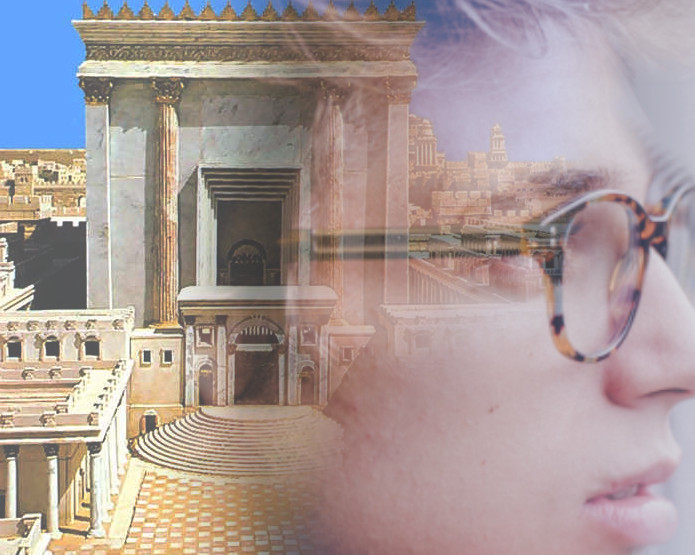
BS”D
Volume 37, No. 27
8 Iyar 5783
April 29, 2023
Sponsored by the Katz family on the yahrzeit of Yehuda ben Shmuel Indig a”h
In the first of this week’s two Parashot, we read about the service that the Kohen Gadol performed on Yom Kippur. The offerings in the Bet Hamikdash on that day include two male goats–the Se’ir Ha’penimi / “inside goat,” whose blood is sprinkled in the Holy of Holies and on the Mizbei’ach / altar, and the “Se’ir La’zazel, which is not offered in the Temple at all, but rather is thrown off of a cliff in the wilderness.
R’ Yaakov Moelin z”l (Maharil; 1365-1427; Germany; his customs are a major source for the practices of Ashkenazic Jews relating to prayer) stated that he wondered all his days why so many of the Piyutim / hymns on Yom Kippur are devoted to the Se’ir Ha’penimi rather than to the Se’ir La’zazel. The Se’ir Ha’penimi atones only for Tum’at Mikdash Ve’kadashav / contaminating the Temple and its holy items, as we read (in our Parashah–16:16), “Thus he shall provide atonement upon the Sanctuary for the Tum’ah of Bnei Yisrael.” In contrast, the Se’ir La’zazel atones for all other sins, as we read (verse 21), “He shall confess upon it all the iniquities of Bnei Yisrael.” Surely the latter should occupy a larger place in our prayers than the former, especially since we do not have a Temple and, therefore, have never contaminated it!
Maharil offers two answers: First, the ability of the Se’ir La’zazel to atone for all of our sins depends on the Se’ir Ha’penimi atoning for our profaning the Temple (see Yoma 40b and 65a). Second, even today when we have no Bet Hamikdash, someone might profane the Temple by improperly entering its vicinity. (Sefer Maharil: Hilchot Yom Ha’kippurim)
R’ Eliyahu E. Dessler shlita (Mashgiach Ruchani of the Ponovezh Yeshiva in Bnei Brak) offers another answer based on Sefer Meshech Chochmah by R’ Meir Simcha Hakohen (1843-1926; rabbi of Dvinsk, Latvia): The Torah says (Shmot 25:8), “They shall make a Mikdash / Sanctuary for Me, so that I may dwell among them.” The verse does not say, “So that I may dwell in it”; rather, it says, “among them.” This means that we, the Jewish People, are the true Mikdash. Indeed, we read in Yirmiyah (7:4), “They (Bnei Yisrael) are the Sanctuary of Hashem.”
It follows, writes R’ Dessler, that profaning the Temple does not refer only to introducing Tum’ah / impurity into the physical confines of the Bet Hamikdash. It also–perhaps, primarily–includes contaminating or profaning ourselves by sinning, which we certainly have done. As such, it makes sense that so much of the Yom Kippur service is devoted to the Se’ir Ha’penimi, which atones for profaning “the Sanctuary.” (Sha’arei Ha’zemanim: Yom Kippur p.264)
********
“Aharon shall bring near the male goat designated by lot for Hashem, and make it a Chatat / sin-offering. And the male goat designated by lot for Azazel shall be stood alive before Hashem, to provide atonement through it, to send it to Azazel to the wilderness.” (16:9-10)
R’ Samson Raphael Hirsch z”l (1808-1888; Germany) writes: These are the symbols of the two paths between which we are to choose.
He elaborates: The path “for Hashem” begins with self-sacrifice. He who chooses it will abdicate all his egoism; he must be ready to sacrifice himself to G-d. But, what appears to be a loss of self is, in fact, an entry into a higher and more genuine form of existence. What appears to be enslavement is, in fact, the attainment of freedom in the truest sense of the term. The animal (here, the male goat) does indeed die, but it dies so that it may be received into the Sanctuary. (Similarly, a person who chooses the path “for Hashem” sacrifices his baser instincts and desires, but he is thereby freed to serve a higher purpose.)
The path “for Azazel,” on the other hand, begins with an apparent preservation of independence. (The goat is not slaughtered as a sacrifice, but rather is sent out of the Temple.) The person who chooses this path stubbornly rejects all notions of sacrifice and devotion. He appears to be on the path of life, but, in fact, it is the sure way to a miserable death (such as the goat for Azazel experiences). It appears to be the path to freedom, but, in fact, it is the path away from the Sanctuary into the wilderness. These are the two paths between which every one of us must choose, R’ Hirsch reminds us. (Collected Writings II p.108)
********
“Ish / A man–Your father and mother you shall revere and My Sabbaths you shall observe–I am Hashem, your Elokim.” (19:3)
What purpose is served by introducing these commandments with the word “Ish” / “A man”?
R’ Yehoshua Kaniel z”l (1895-1970; Chief Rabbi of Haifa, Israel) explains, based on a comment by R’ Yaakov Kranz z”l (1741-1804; Dubno Maggid): A person may say, “When I was a child, I definitely needed my parents and therefore had an obligation to honor and revere them. Now, however, I am an independent adult! Why should I revere my parents?” To counter this, the Torah begins the commandment with “Ish.” Even when you are a grown person, you shall revere your parents.
Similarly, continues R’ Kaniel, a person might say: “I am an adult with responsibilities. I have a family to feed. How can I refrain from working on Shabbat?” No! says the Torah. “Ish”–even a grown man with mouths to feed should observe My Shabbat. Why? Because “I am Hashem, your Elokim”–I make the rules, and I care for you. (Divrei Yehoshua II p.923)
********
“You shall not hate your brother in your heart; you shall rebuke your fellow and not bear a sin because of him. You shall not take revenge and you shall not bear a grudge against the members of your people; you shall love your fellow as yourself–I am Hashem.” (19:17-18)
R’ Elazar Weisblum z”l (1839-1910; Chassidic Rebbe in Galicia, known as R’ Elazar Reisher) writes: This verse appears in the Parashah whose subject is “Kedoshim” / being holy people. Holy people despise sin and, as a result, experience difficulty loving people who act improperly. Therefore, the Torah cautions: True, you have an obligation to rebuke your fellow, but do so because you love him with your heart and soul and want the best for him, not with hatred. You shall not hate your brother, says the Torah; rather, you shall love your fellow as yourself. Only with such feelings may one offer rebuke. (Mishneh Le’melech)
R’ Menachem Mendel Stern z”l (1759-1834; rabbi of Sighet, Hungary) writes: We read (Mishlei 24:24-25), “One who tells a wicked person, ‘You are righteous’–the people will curse him . . . and for rebukers it shall be pleasant.” R’ Moshe Alsheich z”l (1508–1593; Tzefat, Eretz Yisrael) explains that, although one should not flatter a wicked person, one who is rebuking him may say, “You are righteous! This bad deed is beneath you!” Similarly, R’ Stern writes, our verse refers to rebuking “your fellow.” Tell him: “I view you as my friend and equal. Bad deeds are beneath you!” (Derech Emunah)
********
Shabbat
“On the seventh day, Elokim completed His work which He had done, and He abstained on the seventh day from all His work which He had done.” (Bereishit 2:2)
Rashi z”l writes, based on Midrash Rabbah: What did the world lack? Menuchah / Rest! When Shabbat came, Menuchah came. The work of Creation was thus finished and completed. [Until here from Rashi]
R’ Yehuda Ashlag z”l (1885-1954; Poland and Eretz Yisrael; known as the “Ba’al Ha’sulam”) asks: How restful can Shabbat be when one knows that he has to return to work when Shabbat is over?
He answers: In truth, the holiness of Shabbat is so great that it enables a person to put aside any thoughts of the work that lies ahead.
Nevertheless, continues R’ Ashlag, the fact remains that a person must return to his work, which would seem to make Menuchah on Shabbat imperfect in an objective sense. But that imperfection is by Hashem’s design. R’ Ashlag explains: We read (Yeshayah 45:18), “He did not create [the world] for emptiness; He fashioned it to be inhabited.” This world was created as a place to toil [both physically and spiritually]; therefore, Menuchah has no place in this world. The place for Menuchah is in the World-to-Come.
As such, concludes R’ Ashlag, when the Midrash states that the world lacked Menuchah, it actually means that the world lacked a way to taste the Menuchah that awaits in the future. Such a taste is necessary to motivate man to toil and to complete the tasks assigned to him. Therefore, Hashem lovingly gave us Shabbat, on which we can taste true Menuchah. (Ma’amarei Ha’sulam: Darchei Avodah Va’chassidut p.195)
********
Midrash Rabbah refers to the Jewish People as the “Ben Zug” / spouse or mate of Shabbat. R’ Shlomo Goldman z”l (1869-1945; Zhviller Rebbe) writes: Everything that Hashem created has something to give, and human beings are the beneficiaries of that giving. Shabbat, too, has so much spiritual pleasure and holiness to share, but most of the world cannot even sense it. The Jewish People, however, are Shabbat’s spouse; like a spouse, who is uniquely positioned to receive from the other spouse, the Jewish People uniquely can receive what Shabbat has to offer. (Yesod Tzaddik)


